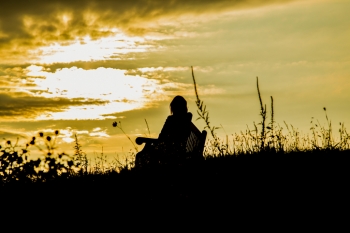Dr. Pauline Boss coined the phrase "ambiguous loss" in the 1970s to describe two types of loss; the first is physical absence with psychological presence (anything from a loved one being lost at sea to experiencing a divorce or adoption). The second is physical presence with psychological absence (a loved one with dementia, for example). These are complicated, confusing kinds of losses that resist closure or resolution.~Rachel Friedman (From And Then We Grew Up--On Creativity, Potential, And The Imperfect Art Of Adulthood)
I've vacillated between these two types of losses during the Pandemic. Some days I've felt the absence of all I knew pre COVID-19--coming and going as I pleased, taking for granted the self-checkout at the library without a thought of asking myself, "Who's been touching this screen before me?" Seeing in person and hugging my children, grandchildren and friends. Then other days I've been a physical presence to my husband, yet exhibited psychologically distant behaviors, detachment a go-to. Not saying much.
Perhaps I practice the discipline of grieving that Henri Nouwen, late theologian, speaks of in his writings. Grief and lament can be a current to take me where I need to go. I've asked myself, "What am I to learn from this experience? What am I to do? What are new thought patterns that can emerge from moving forward through this lock down?"
Embracing stillness is one of my lessons. On weekends, I feel subtle pressure to permit only a certain amount of time to read and record findings. I force myself to pack up my notebooks and sigh, "If only I had another couple of hours." Yet I feel too guilty to indulge, thinking, "I've got to do the laundry or run errands or do the filing or, or or...Yesterday I found myself in an entirely different mode. I sat for hours, with no deadline, underlining discoveries in a new book with yellow highlighter, then wrote out my observations. It was as if I'd found a bench at sunset, and allowed myself to sit and watch the sun depart, the sky turn velvet, waiting for the stars to appear. Shining friends to keep me company.
Stillness led me to another lesson where I asked myself who I wanted to be as a result of this increased solitude. I wrote:
There is an amalgamation formulating during the Pandemic--a cystallization of my own ideals--leading me to think about the type of person I want to be, the kind of qualities I want to exhibit to others, the legacy I want to leave behind for my family. The formation coming together feels somewhat fragmented. The only word that I can think to describe what I'm trying to piece together is love. The particles beginning to solidify include generosity, mercy, vulnerability, rest, gratitude, listening, kindness, acceptance, compassion, empathy, forgiveness, joy, strength, wholeness, peace, beauty and light. I know these fragments are all attributes of God. I can only demonstrate them by the power of His grace.
Perhaps I'm feeling in synch with the earth. She's exhaling in relief, not having to contend with so many people in her wake. It's as if she's resting on the bench of contemplation, catching her breath, embracing the stillness, praying we people will be good students.

